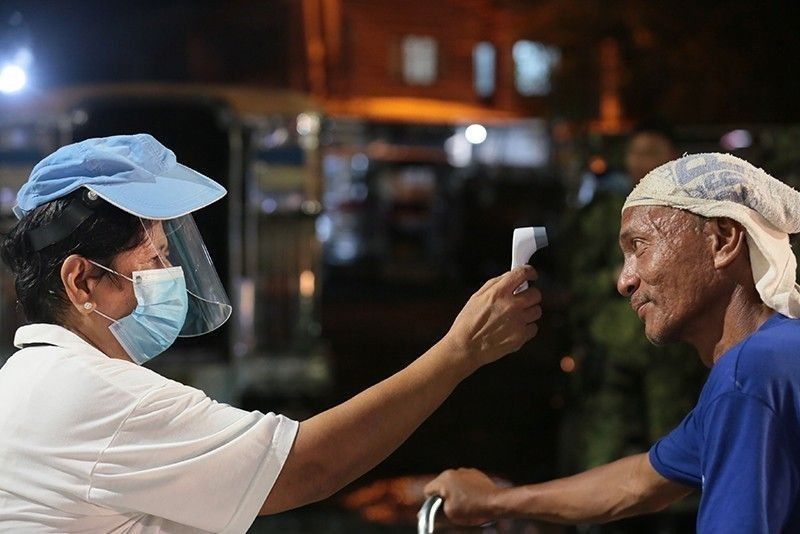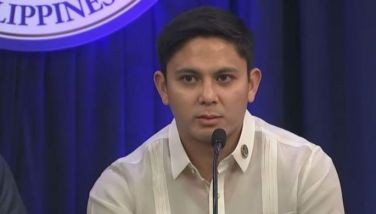SC asked: Stop quarantine restrictions on seniors

MANILA, Philippines — A retired government official has asked the Supreme Court (SC) to issue a temporary restraining order to stop the Inter-Agency Task Force for the Management of Emerging Infectious Diseases (IATF) from imposing quarantine restrictions on senior citizens during the pandemic, saying these were inhuman and violated their rights.
In the 45-page petition for declaratory relief filed before the SC on Sept. 24, lawyer Eugenio Insigne asked the Court to issue a writ of preliminary injunction enjoining the Office of the President (OP) and/or IATF from executing and/or implementing or giving effect in any manner to the questioned orders/resolution.
Once the justices have given course to his petition, Insigne hopes that they would declare the orders or resolutions invalid for violating the Constitution and other pertinent laws.
Insigne, 65, also asked the SC to permanently enjoin the OP and IATF and other persons or instrumentalities of the government from executing and/or otherwise implementing or giving effect in any manner to the subject resolutions/orders.
Named respondents in the petition are the IATF, task force chair Health Secretary Francisco Duque III, vice co-chair Cabinet Secretary Karlo Nograles, vice-chair Interior Secretary Eduardo Año and Executive Secretary Salvador Medialdea.
Insigne, who served as chairman of the National Commission of Indigenous Peoples (NCIP) from 2008 until 2010, said Republic Act 11469 or “The Bayanihan to Heal as One Act” was created at a time of national emergency but it did not specifically mention that the elderly should be quarantined, which is “both illegal and unconstitutional.”
The quarantine also violates RA 7432, otherwise known as the Senior Citizens Law as amended by RA 9257 or the Expanded Senior Citizens Act of 2003; and RA 9994 or the Expanded Senior Citizens Act of 2010.
Insigne asked the Court to grant his petition on several grounds, including violation of the human rights of senior citizens and others included in the quarantines under the international human rights laws and the Constitution.
Second, they were also denied freedom of choice. The quarantine was imposed without consultation, without the consent of those affected and denied the right to due process.
Third, the quarantine causes severe negative mental and psychological impact of quarantine, adding that the cure is worse than the problem.
He said medical experts in London conducted several studies that reportedly showed that data from adults aged 50-81 indicated social isolation is independently associated with reduced physical activity and increased sedentary time, suggesting that this may play a role in the increased risk of disease.
The petitioner also asked the SC to determine the legality and constitutionality of portions of the Omnibus Guidelines on the Implementation of community quarantine in the Philippines that was approved by the OP under Executive Order 112 on April 30. This ordered all persons below 21 and above 60, those with immunodeficiency, comorbidities and other health risks and pregnant women to remain in their residence at all times except when indispensable under the circumstances for obtaining essential goods and services or for work in permitted industries and offices.
Insigne said resolutions issued by the IATF, including EO 112, “is not proportionate to its aim as it limits their freedom. Quarantine is a very restrictive measure. It isolates senior citizens.”
The petitioner also explained that since senior citizens are aware that they are vulnerable to COVID-19, they would be taking precautions.
He believed that only the elderly, who are 70 years old and above, should be quarantined, if needed, because of their advanced age.
There are other measures such as the use of face masks, social distancing and wearing of personal protective equipment (PPE) to fight COVID-19.
Just like other senior citizens, he would have wanted to enjoy his retirement such as going to the mall, the church and meeting friends. But the community quarantine restrictions for the last six months have deprived him from taking part in these activities because of the fear they might be infected by the virus and spread COVID-19 to others.
Meanwhile, lawyer and senior citizens’ rights advocate Romulo Macalintal urged yesterday the Department of Transportation (DOTr) and the Toll Regulatory Board (TRB) to immediately implement the law granting 20 percent discount to persons with disability (PWDs) and senior citizens on toll fees of skyways and expressways.
Macalintal made the call as the use and installation of radio frequency identification (RFID) in all toll lanes had been mandated by the DOTr beginning Nov. 2 as part of measures to stop the spread of the coronavirus disease.
He cited Section 6.6, Rule 4 of the Implementing Rules and Regulations (IRR) of Republic Act 9442, the Magna Carta for PWDs which provides that PWDs shall be entitled to “at least 20 percent on toll fees of skyways and expressways” provided the vehicle is registered under their names.
The same provision directs the DOTr and the TRB to issue the corresponding directives to toll operators for the implementation of the PWDs’ privilege, he said.
He said Article 7 of the IRR of RA 9994 or the Expanded Senior Citizens Act of 2010 provides that senior citizens are entitled to a 20 percent discount on public land transportation.
Macalintal said he wrote a letter to DOTr Secretary and TRB chairman Arthur Tugade, requesting for the immediate implementation of the law by issuing the corresponding circulars and directives to all toll operators in the country as mandated by law.
Early voting for seniors
Meanwhile, Cagayan de Oro City Rep. Rufus Rodriguez, chairman of the House committee on constitutional reforms, called on other lawmakers to hasten the approval of a bill that would allow PWDs and senior citizens to vote early during elections.
He said a substitute bill for House Bill 2839 has been approved by the House committee on suffrage and is now at the appropriations committee for its “budgetary provision.”
“We hope that Congress could approve the bill in time for its implementation for the next combined presidential-congressional-local elections in May 2022,” said Rodriguez.
The measure provides that the Commission on Elections (Comelec) would conduct early voting for senior citizens and PWDs within seven working days before the date of a national or local election.
There shall be a nationwide voter registration for senior citizens and PWDs availing themselves of early voting. Those who do not register can vote on election day.
The Comelec would designate polling places that are “safe, highly accessible and fitted with the necessary communication, visual and physical aids.”
The poll body would conduct a national information campaign on advance voting. It would keep a record of senior citizens and PWDs who are registered voters.
Rodriguez cited the case of the US, where “early voting increased turnout by making it easier for people to vote.” He wants the elderly and PWDs to vote in advance in national and local elections every three years.
“Research shows that in the 24 states in America with no-excuse absentee voting, turnout increased in 2004 by 6.7 percent, whereas it increased by 6.2 percent for other states,” he pointed out.
“In the 11 states that had early voting in 2002 and 2004, turnout increased by an average of 7.2 percent as opposed to 6.2 percent in states without early voting,” he explained further. – Helen Flores, Delon Porcalla
- Latest
- Trending



























